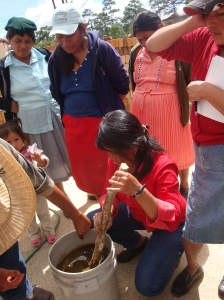Scroll down to the third paragraph if continued from our August 2012 E-Newsletter
Lucila is a hard-working elderly woman who has been a client with Adelante for a year and a half. Lucila lives alone in a humble home built nearly twenty years ago in a rural village outside of Orocuina, which is located in the southern department of Choluteca. Several months ago, the wall of Lucila’s bedroom collapsed after a very severe rainy season that wreaked havoc in Choluteca last year. Akin to the reality faced by much of the rural poor, Lucila did not have the income or the savings to repair the damage immediately. Thankfully, Lucila quickly became an AA client with Adelante, which made her eligible for a Home Improvement Loan. AA clients must have at least three loan cycles, make their loan payments on time, and attend assembly meetings consistently. In March, Lucila was awarded a loan of L. 5,000 or $263 to build a new wall for her bedroom. Since the rural poor often struggle to enhance their housing over several years, this new loan product is in high demand by our clients.
Not only is Lucila grateful for Adelante’s Loan Program, but she is also an enthusiastic supporter of the Business Education Program. At assembly meetings held every two weeks, clients receive educational presentations from their Credit Officers. Even though Lucila has worked as a micro-entrepreneur for nearly her entire life, she still appreciates the business development themes, she explains:
¨The educational lessons help us with our businesses, for example they explain how to manage and promote our businesses better so that we can earn more profits.¨
Before withdrawing her first microloan from Adelante for just L. 1,500 or $79, Lucila always worked as a small business entrepreneur, investing in different income-generating activities. Currently, Lucila produces and sells snack foods and fresh fruit juices out of her home and door-to-door in her community. In the past, Lucila worked with other lending institutions to support her small business endeavors. Now Lucila no longer obtains loans from other sources, and she proudly confirms that she is a client exclusively with Adelante. Lucila affirms, ¨With Adelante, there are not a lot of requirements to take out a loan, and it’s very easy, not complicated like with some of the other institutions I have worked with in the past.¨ In the future, Lucila plans to maintain her AA status in hopes of obtaining another Home Improvement Loan so she can keep upgrading her modest home.
Since each of her seven children are grown and live apart, Lucila is not responsible economically for anyone else but herself, though she does take pleasure in spending time with her family. One of Lucila’s daughters lives in the same community, so she often keeps her mother company at the house. Lucila’s children who live further away often go to her house to spend the night, and she enjoys visits with her grandchildren, nine in total. Lucila is very fortunate to have a tight-knit family, but her children also suffer from poverty so having a micro business enables her to be independent in her old age. Recently, Lucila received her fourth group loan from Adelante for 4,000 or $211, which she used to invest in producing more delicious homemade food and drink. Lucila expects to keep boosting her profits over future loan cycles in order to continue improving her standard of living.
































